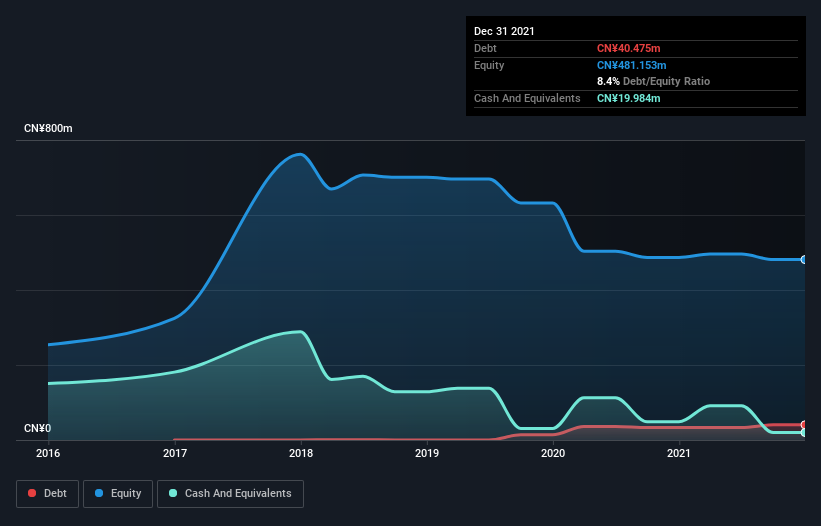- Hong Kong
- /
- Specialty Stores
- /
- SEHK:2122
Is Kidsland International Holdings (HKG:2122) A Risky Investment?

Howard Marks put it nicely when he said that, rather than worrying about share price volatility, 'The possibility of permanent loss is the risk I worry about... and every practical investor I know worries about.' So it might be obvious that you need to consider debt, when you think about how risky any given stock is, because too much debt can sink a company. We can see that Kidsland International Holdings Limited (HKG:2122) does use debt in its business. But the more important question is: how much risk is that debt creating?
When Is Debt A Problem?
Debt assists a business until the business has trouble paying it off, either with new capital or with free cash flow. In the worst case scenario, a company can go bankrupt if it cannot pay its creditors. However, a more usual (but still expensive) situation is where a company must dilute shareholders at a cheap share price simply to get debt under control. By replacing dilution, though, debt can be an extremely good tool for businesses that need capital to invest in growth at high rates of return. The first thing to do when considering how much debt a business uses is to look at its cash and debt together.
View our latest analysis for Kidsland International Holdings
What Is Kidsland International Holdings's Net Debt?
As you can see below, at the end of December 2021, Kidsland International Holdings had CN¥40.5m of debt, up from CN¥33.4m a year ago. Click the image for more detail. However, because it has a cash reserve of CN¥20.0m, its net debt is less, at about CN¥20.5m.

A Look At Kidsland International Holdings' Liabilities
Zooming in on the latest balance sheet data, we can see that Kidsland International Holdings had liabilities of CN¥350.3m due within 12 months and liabilities of CN¥75.7m due beyond that. On the other hand, it had cash of CN¥20.0m and CN¥174.4m worth of receivables due within a year. So its liabilities total CN¥231.6m more than the combination of its cash and short-term receivables.
This deficit casts a shadow over the CN¥111.4m company, like a colossus towering over mere mortals. So we definitely think shareholders need to watch this one closely. At the end of the day, Kidsland International Holdings would probably need a major re-capitalization if its creditors were to demand repayment.
In order to size up a company's debt relative to its earnings, we calculate its net debt divided by its earnings before interest, tax, depreciation, and amortization (EBITDA) and its earnings before interest and tax (EBIT) divided by its interest expense (its interest cover). Thus we consider debt relative to earnings both with and without depreciation and amortization expenses.
Given net debt is only 0.42 times EBITDA, it is initially surprising to see that Kidsland International Holdings's EBIT has low interest coverage of 1.6 times. So one way or the other, it's clear the debt levels are not trivial. We also note that Kidsland International Holdings improved its EBIT from a last year's loss to a positive CN¥16m. There's no doubt that we learn most about debt from the balance sheet. But it is Kidsland International Holdings's earnings that will influence how the balance sheet holds up in the future. So when considering debt, it's definitely worth looking at the earnings trend. Click here for an interactive snapshot.
Finally, a company can only pay off debt with cold hard cash, not accounting profits. So it is important to check how much of its earnings before interest and tax (EBIT) converts to actual free cash flow. Happily for any shareholders, Kidsland International Holdings actually produced more free cash flow than EBIT over the last year. That sort of strong cash conversion gets us as excited as the crowd when the beat drops at a Daft Punk concert.
Our View
To be frank both Kidsland International Holdings's interest cover and its track record of staying on top of its total liabilities make us rather uncomfortable with its debt levels. But on the bright side, its conversion of EBIT to free cash flow is a good sign, and makes us more optimistic. Looking at the balance sheet and taking into account all these factors, we do believe that debt is making Kidsland International Holdings stock a bit risky. Some people like that sort of risk, but we're mindful of the potential pitfalls, so we'd probably prefer it carry less debt. The balance sheet is clearly the area to focus on when you are analysing debt. But ultimately, every company can contain risks that exist outside of the balance sheet. We've identified 2 warning signs with Kidsland International Holdings , and understanding them should be part of your investment process.
If you're interested in investing in businesses that can grow profits without the burden of debt, then check out this free list of growing businesses that have net cash on the balance sheet.
If you're looking to trade Kidsland International Holdings, open an account with the lowest-cost platform trusted by professionals, Interactive Brokers.
With clients in over 200 countries and territories, and access to 160 markets, IBKR lets you trade stocks, options, futures, forex, bonds and funds from a single integrated account.
Enjoy no hidden fees, no account minimums, and FX conversion rates as low as 0.03%, far better than what most brokers offer.
Sponsored ContentValuation is complex, but we're here to simplify it.
Discover if Kidsland International Holdings might be undervalued or overvalued with our detailed analysis, featuring fair value estimates, potential risks, dividends, insider trades, and its financial condition.
Access Free AnalysisHave feedback on this article? Concerned about the content? Get in touch with us directly. Alternatively, email editorial-team (at) simplywallst.com.
This article by Simply Wall St is general in nature. We provide commentary based on historical data and analyst forecasts only using an unbiased methodology and our articles are not intended to be financial advice. It does not constitute a recommendation to buy or sell any stock, and does not take account of your objectives, or your financial situation. We aim to bring you long-term focused analysis driven by fundamental data. Note that our analysis may not factor in the latest price-sensitive company announcements or qualitative material. Simply Wall St has no position in any stocks mentioned.
About SEHK:2122
Kidsland International Holdings
An investment holding company, trades and sells toys and related lifestyle products in Mainland China, Macau, and Hong Kong.
Medium-low and slightly overvalued.
Market Insights
Community Narratives



